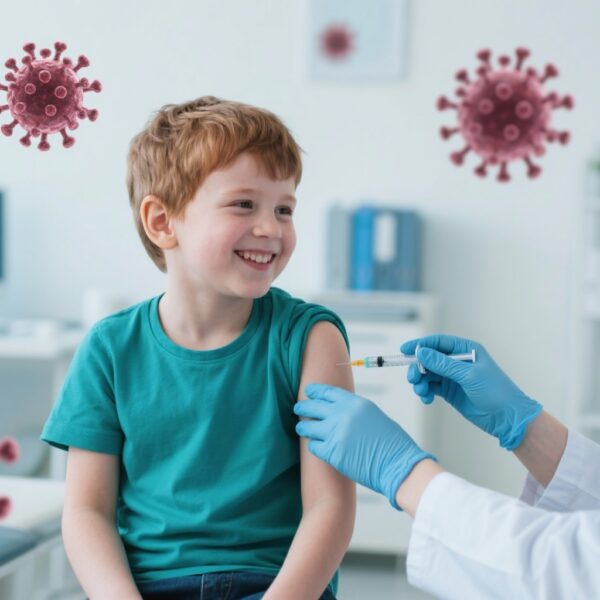Highlight
– Covid-19 mRNA vaccines maintain moderate effectiveness against the XBB.1.5 subvariant with hospitalization risk reduction around 46%-50% in adults.
– RSV vaccines and monoclonal antibody prophylaxis show strong protection against hospitalization in infants and older adults, with vaccine effectiveness ≥68%.
– Influenza vaccines remain moderately effective, with 48% effectiveness in adults and 67% in children against hospitalization.
– Safety signals remain consistent with previous data; rare myocarditis in adolescents (Covid-19 vaccines) and Guillain-Barré syndrome in older adults (RSVPreF vaccine) must be monitored.
– No significant association of maternal RSV vaccination with preterm birth was observed.
Background
Respiratory viruses such as SARS-CoV-2 (Covid-19), respiratory syncytial virus (RSV), and influenza impose significant morbidity and mortality globally. Annual vaccination has been the cornerstone for reducing severe outcomes, hospitalizations, and deaths associated with these infections. Recent changes in vaccine advisory processes in the United States have introduced potential disruptions to immunization guidance. This underscores a critical need for independent and updated evidence synthesis, especially as new viral variants and updated vaccines emerge, to inform clinical and public health policies for the 2025-2026 season. The underlying aim is to optimize vaccine strategies targeting varied populations including immunocompromised individuals, older adults, infants, and pregnant women.
Study Design and Methods
This article summarizes a systematic review conducted on U.S.-licensed vaccines for Covid-19, RSV, and influenza. The review updated the Advisory Committee on Immunization Practices (ACIP) Evidence-to-Recommendations conducted in 2023-2024. Databases including PubMed/MEDLINE, Embase, and Web of Science were searched to identify relevant studies evaluating vaccine efficacy, effectiveness, and safety. The inclusion criteria encompassed observational cohort and case-control studies reporting outcomes such as hospitalization, other clinical disease end points, and adverse events. The analysis pooled effect estimates, including vaccine effectiveness percentages with 95% confidence intervals (CI), enabling a robust assessment across diverse population subgroups and viral variants.
Key Findings
Covid-19 Vaccines
The mRNA vaccines targeting the SARS-CoV-2 XBB.1.5 subvariant demonstrated pooled vaccine effectiveness against hospitalization of 46% (95% CI, 34 to 55) from cohort studies and 50% (95% CI, 43 to 57) from case-control studies among adults. Immunocompromised adults showed slightly lower effectiveness at 37% (95% CI, 29 to 44). Additionally, vaccines targeting the newer KP.2 subvariant reported higher effectiveness of 68% (95% CI, 42 to 82) in a case-control study. These findings confirm ongoing moderate protection rates from current mRNA formulations, reflecting viral immune evasion dynamics.
RSV Vaccines and Prophylaxis
Multiple interventions were evaluated for RSV prevention. Maternal RSV vaccination administered in pregnancy safely conferred passive immunity to infants, reducing hospitalization by approximately 68% or more. Similarly, nirsevimab, a monoclonal antibody administered to infants, showed comparable hospitalization reduction rates. In adults aged 60 years or older, RSVPreF vaccines achieved at least 68% vaccine effectiveness against hospitalization. These data reinforce the compelling role of RSV vaccination programs across diverse age groups to prevent severe disease.
Influenza Vaccines
Influenza vaccination displayed moderate effectiveness against hospitalization: 48% (95% CI, 39 to 55) in adults aged 18 to 64 and notably 67% (95% CI, 58 to 75) in children. These consistent figures mirror previous seasonal influenza vaccine performance and underline the continued value of vaccination in reducing influenza hospitalization burden.
Safety Profiles
The safety data align with prior evaluations. Covid-19 vaccine-associated myocarditis, primarily in male adolescents, remains rare with an incidence between 1.3 to 3.1 per 100,000 doses. Notably, myocarditis risk diminishes with longer intervals between mRNA vaccine doses. The RSVPreF vaccine was linked to 18.2 excess cases of Guillain-Barré syndrome per million doses in older adults, a safety signal warranting ongoing surveillance. Importantly, maternal RSV immunization at 32 to 36 weeks’ gestation was not significantly associated with preterm birth risk, supporting its safety in this population group.
Expert Commentary
These updated data provide critical reassurance regarding the effectiveness and safety of respiratory virus vaccines heading into the 2025-2026 season. While reduced vaccine effectiveness against emerging SARS-CoV-2 variants highlights the need for continuous vaccine adaptation, the sustained protection against hospitalization remains clinically meaningful. The strong performance of RSV vaccines and monoclonal antibodies heralds a promising future in preventing RSV-related morbidity in infants and older adults. Ongoing monitoring of rare adverse events is essential to maintain public confidence and optimize risk-benefit assessment. The rigor of this independent review supports policy decisions that prioritize immunization in high-risk populations and guide practitioners in patient counseling.
Conclusion
The comprehensive updated systematic review confirms that Covid-19, RSV, and influenza vaccines are effective and safe for widespread use during the 2025-2026 respiratory virus season. Despite evolving viral variants and the complexity of vaccine advisory changes, current immunization strategies provide significant protection against hospitalization and support public health goals. Continued surveillance for rare adverse events and vaccine effectiveness against emergent strains remains necessary. Healthcare providers should encourage vaccination to mitigate the substantial clinical and societal burden of respiratory viral infections.
Funding and Disclosures
This review was funded by the Center for Infectious Disease Research and Policy and the Alumbra Innovations Foundation. The authors declared no conflicts of interest related to this publication.
References
Scott J, Abers MS, Marwah HK, McCann NC, Meyerowitz EA, Richterman A, Fleming DF, Holmes EJ, Moat LE, Redepenning SG, Smith EA, Stoddart CJ, Sundaram ME, Ulrich AK, Alba C, Anderson CJ, Arpey MK, Borre E, Ladines-Lim J, Mehr AJ, Rich K, Watts C, Basta NE, Jarolimova J, Walensky RP, Dugdale CM. Updated Evidence for Covid-19, RSV, and Influenza Vaccines for 2025-2026. N Engl J Med. 2025 Oct 29. doi: 10.1056/NEJMsa2514268. Epub ahead of print. PMID: 41160817.



